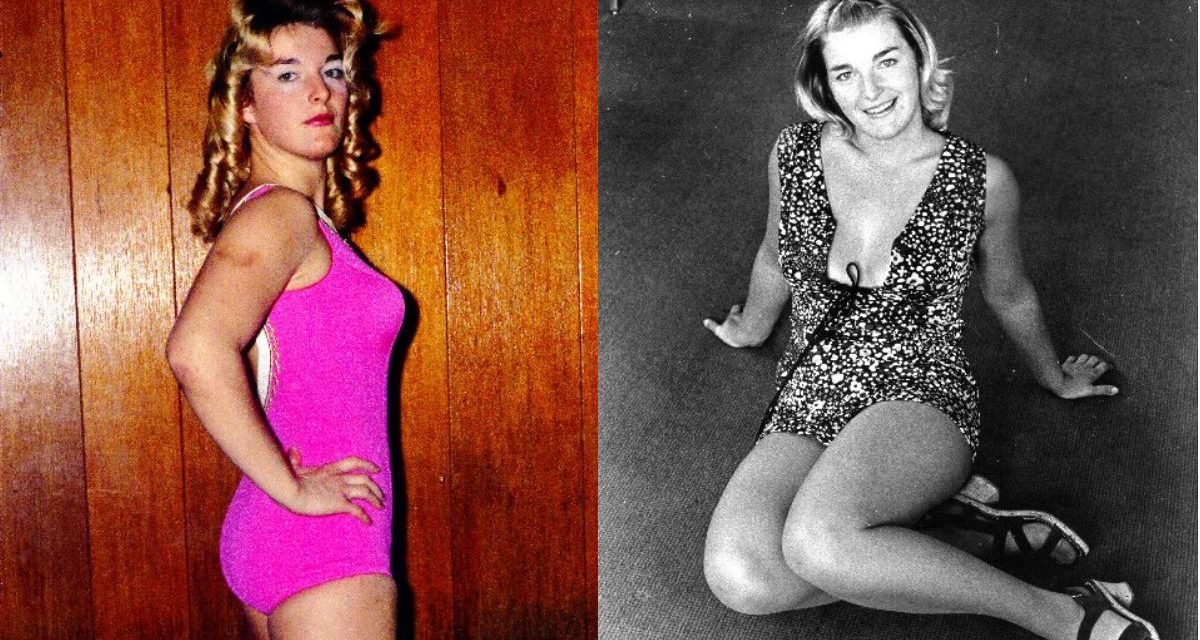Each year, members of the Baseball Writers’ Association of America vote in the new members of the National Baseball Hall of Fame and Museum in Cooperstown, NY. Many of the scribes take a moment to write a column about who they selected and why. Selection to the Professional Wrestling Hall of Fame in Amsterdam, NY, are set up similarly, with noted wrestlers and historians voting on the choices for that year. So here are our thoughts on who we voted for — and why, along with a note about who was actually elected.
STEVE JOHNSON: It’s tough enough to vote for, say, the baseball Hall of Fame, where there are some real numbers to point to. Not so in wrestling, where we run the risk of the “lowest common denominator” argument—i.e., if “X” is in, then “Y” should be in, too. There’s no clear cutoff, so we have to rely on the information we’ve dug up as writers, and the interviewers and analysis we’ve collected through the years. But that makes the discussion fun.
PIONEER ERA, 1800-1942
Charley Fox
Bert Assirati
Joe Malcewicz
Great Gama
Ali Baba
GREG OLIVER: Naturally, this is the hardest one for people to vote on, since the names are all from before any of the voters were alive (especially now with the passing of Mae Young). Many have labelled me a historian, but I see myself as a writer first and foremost, who relies on the hard work of true historians like Fred Hornby, Steve Yohe, J Michael Kenyon and Don Luce to learn about and explain the past. I chose Assirati, as anyone from England raves about him and his importance, and Great Gama, for the same reason, but from India. More people know Malcewicz as the promoter from San Francisco than the wrestler that he was. Fox seemed odd to even be on the list, and Ali Baba, well, it was a gimmick that rose to the top of the profession for a short while.
STEVE JOHNSON: To me, this was the most disappointing list. I fancy myself as a writer too, but more than Greg, I’ve been locked into the 1920s and 1930s as part of my research for my book on Jim Londos. Two names missing from consideration are Joe Savoldi and Steve Casey, both world champions in their day and big box office draws around the country. If Savoldi didn’t invent the modern dropkick, he institutionalized it and made it his own. Casey was a strapping Irish immigrant as beloved by New England fans as boxer John L. Sullivan in his heyday. Greg and I considered each to be among the 25 most important heroes in wrestling history. Baba was an interesting gimmick guy, but he came 30 years after the Terrible Turk angle started and got snookered into losing the world title. Assirati belongs in the International category. I could see Gama but in the end voted only for Malcewicz, who had a nice 20-year career pre-promoter and gave Joe Stecher a run for his money.
2015 PWHF INDUCTEES: Joe Malcewicz and Great Gama
LADIES
Rita Cortez
Cora Livingston
Bonnie Watson
Leilani Kai
Vivian Vachon
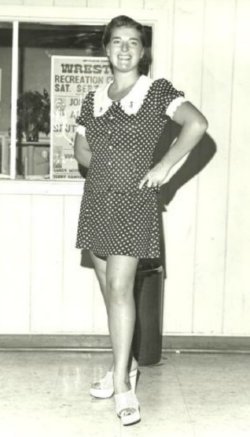 Vivian Vachon. |
GREG OLIVER: We’re talking apples and oranges here. Cora Livingston was a pioneer with women’s pro wrestling in the 1930s and got my vote. Cortez and Watson were from the “Moolah era” of the 1950s and 1960s, but I don’t see either as hall of famers. I think Leilani Kai will get in one day and is deserving, especially for her work in Japan. As for Vachon, trying to ignore my love of all things Vachon is tough, but not a hall of famer.
STEVE JOHNSON: Livingston was married to Paul Bowser, wrestler and later long-time promoter in Boston. She was the first dominant woman wrestler, so dominant that Bowser secretly borrowed money from promoter Jack Pfefer to replenish the family’s bank account after some losses at the track. Despite the husbandly push, she was tops in her day. I wish I could have seen her; her athleticism is described in Babe Didrikson-like terms. I would give consideration to Kai next time around. I wish Viv was still around; bet she could kick some diva tail.
2015 PWHF INDUCTEE: Vivian Vachon
TAG TEAMS
The Bastien Bros (Red Bastien & Lou Klein)
The Kentuckians (Grizzly Smith & Luke Brown)
The Black Jacks (Mulligan & Lanza)
Gene & Ole Anderson
The Fabulous Freebirds (Michael P.S. Hayes, Buddy Roberts & Terry Gordy)
GREG OLIVER: Like with the women, it’s difficult to compare teams from the 1950s to teams from the 1980s. Of the five nominees, no team meant more to the history of the business than The Fabulous Freebirds. They were key parts of a couple of major promotions (World Class, Georgia, Mid-South) and consistently in the main event picture. The sum of their parts was greater than the teams as individuals. They are the highest ranked team (#4) from our book, The Pro Wrestling Hall of Fame: The Tag Teams, that is eligible for induction; The British Bulldogs (Dynamite Kid and Davey Boy Smith), our number three team (after The Kangaroos and The Road Warriors), will be eligible down the road. The other four teams had decent regional success, but I’m not sold 100% on them as deserving.
STEVE JOHNSON: This is the strongest of the categories. The Freebirds are a no-brainer, a unit that really revolutionized wrestling and its presentation. Their opponents, even the von Erichs, would have been much less without them. Creativity and originality count for a lot in wrestling because they’re so scarce; the ‘Birds had a lot of both. Unlike Greg, I think the Andersons should be in. I know they did most of their wrestling in the Carolinas and Georgia, but they were an innovative pair that stayed on top for years because of their drawing power, not just the fact Ole was a booker. I would like to see the Valiants considered; their reigns extended from New York to Indianapolis to Georgia to San Francisco. The Kentuckians were a fun team that got a enormous boost from The Assassins. Klein and Bastien really don’t merit inclusion here. It can be told years after his death, but Bastien didn’t care one bit for Klein or the team and was anxious to get out of it. Red’s team with Billy “Red” Lyons would be a good candidate.
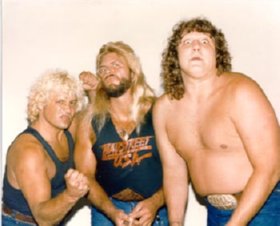
Both Johnson and Oliver agreed that the Fabulous Freebirds were great choices for the Professional Wrestling Hall of Fame.
2015 PWHF INDUCTEES: The Fabulous Freebirds (Michael P.S. Hayes, Buddy Roberts & Terry Gordy)
TELEVISION ERA, 1943-1984
Ronnie Garvin
Thunderbolt Patterson
Pedro Morales
Whipper Billy Watson
The Spoiler (Don Jardine)
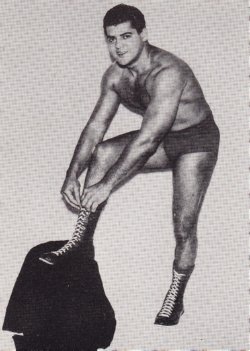 A young Pedro Morales. |
STEVE JOHNSON: To me, Watson is the most deserving wrestler not in the Pro Wrestling Hall of Fame. You don’t have to make a case for him; his record as a legend speaks for itself. I think the fact he was based in Toronto, not the United States, is a point in his favor that shows the continental breadth of his appeal. Pedro is most known as the man who succeeded Bruno Sammartino as WWWF champion (after a Koloff interlude). But he rang up a main event record in California before that. Sure, he was an ethnic hero, but he played that role very well and I’ve been pleasantly surprised by the large number of wrestlers, friend and foe, who recall the former Intercontinental champion as quite a good hand in the ring. There was a big legion of admirers waiting to meet him in New Jersey at one of his few fanfest appearances, and I remember he said to me, “I thought it was going to be all kids!” Garvin, Patterson and Jardine were top stars and headliners too, but I’d put them a cut below. I think Ronnie is a bit underrated because his world title run got tied up in the politics of the day. T-Bolt was a very good heel; a lot of people forget that.
GREG OLIVER: Whipper Watson was a national hero in Canada, and there is no one even close to comparable in history in the United States. I would bet that in, say, 1955, every person in the country would have known who he was—could the same be said of Hulk Hogan in 1986? Maybe. But the point is that Hogan is already in the PWHF, and Watson should be too. Morales doesn’t get enough credit for the star that he was, stuck as he was in Bruno Sammartino’s shadow. Patterson had some real issues with promoters, but not sure if that is a strike against him or for him. I don’t see Garvin as a Hall of Famer at all, but The Spoiler probably should be one day.
2015 PWHF INDUCTEES: Pedro Morales and Whipper Billy Watson
MODERN ERA, 1985-Present
Jim Duggan
Kamala
Curt Hennig
Rick Martel
“Dr. Death” Steve Williams
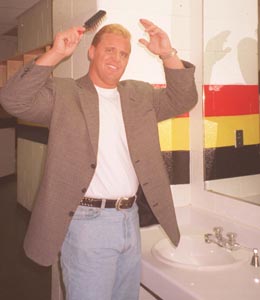 Curt Hennig was indeed “Mr. Perfect.” — Sun file photo |
STEVE JOHNSON: Not a lot of separation here, so I’ll apply some of the standards Greg and I used in our book. Were these guys considered the top wrestlers in the world? I’d probably say yes to Hennig, Martel and Williams. Were they on top regularly at different times, in different territories? A qualified yes to all of them, with extra points for Williams in Japan. Was their box office more dependent on them or their opponent? I sense they all could draw on their own, but more so for the last three.
Could they put on a compelling match with wrestlers of differing styles? Here, I’d say Martel and Hennig were probably more adaptable, but that’s just an opinion. Was he an innovator and responsible for any new moves or gimmicks? I wouldn’t say Doc was an innovator, but he certainly brought a style and feel to his game that had a unique flavour about it. He’s my first choice.
The margin between “The Model” and “Mr. Perfect” is thin. Martel’s career was a little longer, Hennig’s probably had a slightly higher peak. Injuries probably robbed Hennig of more productive work, but Martel fought his own aches and pains. I’ll take Martel for the superior longevity and a 595-day run as AWA champion, the third longest in the fed’s history at a time when that meant something.
GREG OLIVER: Given his longevity and the timing of his stardom, Hacksaw Duggan is the biggest name on this list and for that, I understand why he got his votes, but he was not as important to the business as Rick Martel was. Before he was “The Model,” Martel was a model employee for the AWA, the promotion’s response to Hulk Hogan and Ric Flair, and he was the torchbearer for the company. Curt Hennig was one of the best wrestlers, ever. He deserves inclusion too, but may have to wait. Steve Williams just didn’t have the top run in the big companies in North America to have him be seen in the same light as the first three mentioned here, but will get in one day too. As for Kamala, in a Gimmick Hall of Fame, sure, but not the Pro Wrestling Hall of Fame.
2015 PWHF INDUCTEES: Rick Martel and Curt Hennig
COLLEAGUES
Don Owen
Dick Woehrle
George Curtis Culkin
Leo Garibaldi
Jim Crockett Sr.
STEVE JOHNSON: This category is kind of a catch-all for promoters, managers, referees, announcers and others associated with the mat game, so it’s difficult to compare and weigh their respective contributions. Dick Woehrle was a terrific ref, doing a job that very often gets overlooked when we talk about the things needed to put together an outstanding match. Garibaldi was a fine wrestler-turned-matchmaker, notably in Georgia where he was responsible for feuds like the Vachons versus the Torres brothers. In a close call, I went with Jim Crockett Sr., or “Big Jim,” as he was known. His Carolinas-based territory was a consistent performer for the better part of 50 years, covering a huge area with a huge amount of satisfied wrestler. He was in fairly early on TV wrestling and ran a haven for great tag teams. My one reservation is that the territory really popped after his death, but he certainly laid the groundwork for that. Anyone who reads Dean Silverstone’s book, I Ain’t No Pig Farmer! will probably want to think about whether Owen is an appropriate choice.
GREG OLIVER: I dislike this category just in general. Dick Woehrle was a good ref, yeah, but he was also appointed by the New York State Athletic Commission for much of his time in the WWWF, which somehow changes things in my mind, making him more of a political pawn than a key player in wrestling history. Promoters, by their very nature, are interested in maximizing profit and minimizing expenses, which makes it hard for me to vote for Owen, Culkin or Crockett. I picked Garibaldi, because anyone who had him as their booker usually raves about him, but maybe that’s because he was one of the few non-in-ring bookers, meaning he never put himself over at the expense of others. On a personal level, he was a wonderful resource, incredibly knowledgeable about the wrestling business through the years and years he was in it as a boy, with his father and uncles wrestling, and then as a wrestler and booker.
2015 PWHF INDUCTEE: Jim Crockett Sr.
INTERNATIONAL
Otto Wanz
Tony Charles
Jumbo Tsuruta
Pat Roach
Tiger Jeet Singh
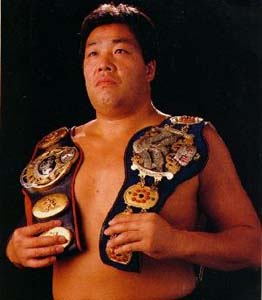 Jumbo Tsuruta |
GREG OLIVER: The International category was added after the Midget category honoured every deserving little person, and it still hasn’t quite figured out what it is meant to be. Bert Assirati from the Pioneer Era probably belongs here instead of there, for example. I’m just pleased that Whipper Billy Watson was moved to the Television Era, where he belongs, and not here, where he has been in the past. The nature of professional wrestling in Canada and the United States is so intertwined that it’s unfair to call a Canadian an “international” candidate. It was easy to discount Wanz, who was a below-average wrestler who ran the German scene, Tony Charles, who came to the United States and fit in well as a mid-carder, mainly in tag teams, and Pat Roach, who was a British grappler, but never a top one — instead, he’s best remembered for fighting Indiana Jones in Raiders of the Lost Ark in the famed plane scene. Tsuruta deserves it, and will be in one day, but I picked Tiger Jeet Singh, who is STILL a major star in Japan and India, years after his last matches.
STEVE JOHNSON: Jeet Singh is a personal favourite, but my vote — agonizingly — went to Tsuruta. U.S. fans might know him from starting in Amarillo, Texas, and later winning the AWA world title from Nick Bockwinkel. Working for All Japan, he was arguably the best wrestler in the world for several years in the 1980s. As a world renowned titleholder and an Olympian as an amateur, I’d say he should be in the inner pantheon of the hall. Tony Charles was a very good pure wrestler and junior heavyweight champion who knew every hold in the book. But you know what? There’s a lot of those guys—Pat Barrett, Les Thornton, Tony Rocco. Next year for Jeet Singh.
2015 PWHF INDUCTEE: Jumbo Tsuruta
